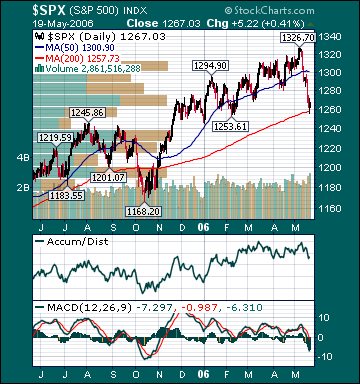
Click here for the Weekly Wrap by Briefing.com.
BOTTOM LINE: Overall, last week's market performance was bearish. The advance/decline line fell, most sectors declined and volume was heavy on the week. Measures of investor anxiety were mixed. The AAII % Bulls fell sharply to 39.39% and is now below average levels, which is a positive. The average 30-year mortgage rate rose to 6.60% which is 139 basis points above all-time lows set in June 2003. I still believe housing is in the process of slowing to more healthy sustainable levels. This will likely result in the slowing of consumer spending, and thus US GDP growth, back to around average rates over the coming months. US economic growth is now estimated by economists to have risen a booming 5.8% during the first quarter.
The benchmark 10-year T-note yield plunged 15 basis points on the week as housing data came in below estimates, the US dollar rose, commodities plunged the most in 25 years and Fed members made mostly hawkish comments. I now believe inflation concerns have peaked for the year as investors begin to anticipate slower economic growth, unit labor costs remain subdued and the mania for commodities continues to reverse course. The 10-year yield has likely peaked for the year, as well.
Unleaded Gasoline futures fell this week and are now 30.0% below September 2005 highs even as refinery utilization remains below normal as a result of the hurricanes last year, a significant amount of Gulf of Mexico oil production remains shut-in and fears over future production disruptions persist. The EIA reported this week that gasoline supplies rose again as demand continued to wane. This is a result of conservation, substitution and demand destruction. Ford Motor reported a few weeks ago that sales for the Explorer, America’s top-selling SUV, plunged 42% in April as purchases of more fuel efficient models remained brisk. Moreover, Bloomberg reported this week that high gas prices are having a staggering impact on truck sales in Texas. The elevated level of gas prices related to shortage speculation should further dampen demand over the coming months, sending gas prices back to reasonable levels.
Natural gas inventories rose more than expectations this week and supplies are now 53.2% above the 5-year average, at an all-time record high for this time of year, even as some daily Gulf of Mexico production remains shut-in. Natural gas prices have plunged 62.2% since December 2005 highs. Notwithstanding this collapse, industrial demand for natural gas has shown few signs of increasing.
US oil inventories are still approaching 9-year highs. Since December 2003, global oil demand is down .24%, while global supplies have increased 4.94%. Moreover, worldwide inventories are poised to begin increasing at an accelerated rate over the next year. I continue to believe oil is priced at extremely elevated levels on fear and record speculation by investment funds, not fundamentals. As the fear premium in oil dissipates back to more reasonable levels and supplies continue to rise, crude oil should head meaningfully lower over the intermediate-term.
Gold fell for the week as the US dollar rose, inflation fears subsided and speculators took profits. The US dollar rose on more hawkish Fed commentary. I expect the dollar to begin to firm over the next few months.
The most economically sensitive stocks underperformed for the week. S&P 500 earnings growth for the 1st quarter was up 16.7% year-over-year, more than double the long-term average and substantially above expectations of 8-9% growth. This marks the 16th consecutive quarter of double-digit profit growth, the best streak since record-keeping began in 1936. The forward p/e on the S&P 500 has contracted relentlessly during this time period and now stands at a very reasonable 14.8.
The average US stock, as measured by the Value Line Geometric Index(VGY), is still up 4.0% so far this year, notwithstanding the recent correction. Moreover, the Russell 2000 Index is up 8.0% year-to-date. In my opinion, the current pullback has provided longer-term investors very attractive opportunities in many stocks that have been punished indiscriminately. However, the most overvalued economically sensitive and emerging market stocks should continue to underperform over the intermediate-term as the manias for those shares subside.
While the major averages have likely bottomed for the year, a test of recent lows could occur over the coming weeks as economic data disappoint. An ensuing Fed pause, lower commodity prices, decelerating inflation readings, lower long-term rates, increased consumer confidence and the realization that growth is only slowing should provide the catalysts for another substantial push higher in the major averages through year-end as p/e multiples begin to expand. I continue to believe the S&P 500 will return a total of around 15% for the year. The ECRI Weekly Leading Index fell this week and is forecasting healthy, but decelerating, US economic activity.
*5-day % Change